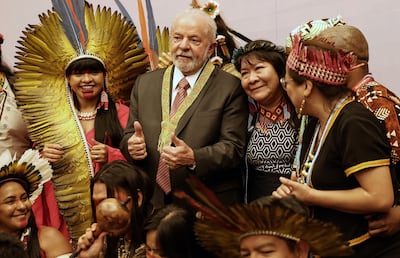People — and plants — across the world breathed a sigh of relief this year after Brazil’s President Jair Bolsonaro was ousted by president-elect Luiz Inacio Lula da Silva, known as “Lula”, a politician with a decidedly more climate-friendly approach than his predecessor.
Mr da Silva, who won the presidential election on October 30, made a pledge to reduce deforestation in the Amazon to zero, protect indigenous people's rights, and take a leading role in responding to the climate crisis.
Under Mr Bolsonaro, deforestation of the Amazon reached a record high, with scientists warning that it was reaching the point of no return. More than 3,980 square kilometres were cleared in the first six months of 2022 alone. Deforestation increased by 73 per cent in 2021, compared with 2018.
Many scientists believe the tipping point from which the Amazon could no longer bounce back is between 20 and 25 per cent deforestation.
It is estimated that between 17 and 20 per cent of the Amazon has been destroyed over the past 50 years.
Mr da Silva made promises to protect the rainforest in his first public statement after winning the election, although Brazilian environmentalists are pushing for concrete plans.
“These are important pledges, but they will need to be paired with a drive to tackle the organised criminal structures that have taken hold in the Amazon under Bolsonaro’s reign of destruction, as well as holding accountable the multinational corporations that source cattle, soy and timber linked to large-scale illegal deforestation,” Luciana Tellez Chavez, environment and human rights researcher at Human Rights Watch, told The National.
“We expect a very different tone from the Lula administration, which is no small change.”
The mood is hopeful that Mr da Silva’s administration will herald a brighter future for the Amazon.
Mr Bolsonaro’s rhetoric encouraged environmental crime and violence in the Amazon, Ms Chavez said.
“However, Lula will have to move beyond words to act decisively. Indigenous peoples and local communities who are under attack for defending the rainforest are entitled to protection and justice.
“The real test will be whether Lula takes on agribusiness for their responsibility in the environmental catastrophe that the past four years have been.”
After beginning his first presidency in 2003, Mr da Silva took on one of the highest Amazon deforestation rates on record. By the end of his second term in 2010, deforestation had dropped by 67 per cent.
However, as Raul do Valle, advocacy leader at WWF Brazil, points out, the current situation Mr da Silva faces is “quite different from that he faced in his first term”.
advocacy leader at WWF Brazil
“During the Bolsonaro administration, environmental agencies were dismantled, the environmental budget was cut, and deforestation was encouraged, including that practised illegally,” said Mr do Valle.
“Reversing this situation will require time, intelligence, financial resources, international co-operation and, above all, political will. The election result demonstrates that at least the political will exists.”
Mr da Silva attended the Cop27 in Egypt and received a “rock star welcome” — while incumbent Mr Bolsonaro, just as in previous years, chose not to attend.
“I’m here today to say that Brazil is ready to come back,” Mr da Silva told the standing-room-only crowd in Sharm El Sheikh.
“There is no climate security for the world without a protected Amazon,” he said.
Mr da Silva said he wanted people to see the region.
“We will spare no efforts to have zero deforestation and the degradation of our biomes by 2030.”

Mr da Silva has been described by indigenous defenders as the Amazon’s “only hope”, and has proposed forming a ministry of indigenous affairs.
However, there was a backlash after he appeared to backtrack on his promise, saying he might instead form a special department linked to the presidential office, rather than a full ministry.
There are 900,000 indigenous people living in Brazil, and their rights were under serious threat during Mr Bolsonaro’s administration.
“Most indigenous populations are quite happy [about Lula’s election],” Mr do Valle said.
“The Bolsonaro years have been very tough for them. Many leaders are threatened by criminals, some have been killed defending their lands and its forests.
“The perspective is to have a 180 degrees U-turn in federal policies: no more official support to illegal loggers or miners; more financial support to good territorial management, to good education.”
The indigenous issue, Mr do Valle said, will be on the top of the political agenda, something he described as “really extraordinary”.
Mr da Silva has his work cut out for him if he intends to repair the damage caused over the past four years — but experts believe he is ready for the challenge.
As Mr do Valle pointed out: “It is never too late to do the right thing.”







